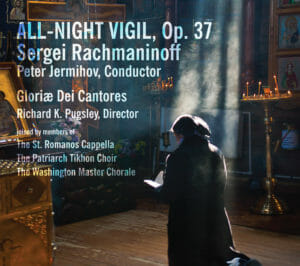Oktavism.com Review: Rachmaninoff’s All-Night Vigil by Gloriæ De Cantores under Peter Jermihov
Prior to reading the review, it deserves noting that of the 7 Oktavists in the Choir on this recording, 4 were from the Patriarch Tikhon Choir including PaTRAM’s CEO, Alexis V. Lukianov.
Review that follows was reprinted from Oktavism.com.

Rachmaninoff’s All-Night Vigil has been performed wonderfully many times. In recent years the Kansas City Chorale & Phoenix Chorale under Charles Bruffy won a Grammy for their 2015 recording. Another award-winning American recording is Robert Shaw’s. For a more authentic Russian sound, we may look to recordings by the USSR Ministry of Culture Chamber Choir under Valeri Polyansky, or the St. Petersburg Chamber Choir under Nikolai Korniev. In my opinion, however, none of these recordings has come close capturing the authority and majesty of the USSR Academic Russian Choir’s 1965 performance under Alexander Sveshnikov. This is precisely what Jermihov’s release accomplishes. As I listened, I was again and again reminded of Sveshnikov’s benchmark recording.
Jermihov’s vision for the project was to “combine the pursuit of musical excellence with a search for the work’s distinctly Christian content,” and furthermore, “an attempt to answer the basic question: How did Rachmaninoff hear this music?” This vision shows through in the performance. The musical virtuosity never overshadows the worship conveyed in the text, but rather augments it. While the Bruffy recording does this better than other American recordings, Jermihov’s goes even further in capturing not only the music’s reverential essence, but also its Russian spirit. The protodeacon’s exclamations are performed by bass Vadim Gan, who is himself a Protodeacon under the First hierarch of the Russian Orthodox Church Abroad at the Synod of Bishops’ Cathedral in New York. The other soloists on this recording also bring a Slavic authenticity to the text: Mariya Berezovska, mezzo-soprano, and Dmitry Ivanchenko, tenor, are both distinguished performers from National Opera of Ukraine in Kiev. Combined with Jermihov’s extensive experience with Church Slavonic and the Orthodox liturgy, these soloists are the perfect answer to the question, “How did Rachmaninoff hear this music?”
The quality of the recording itself is luxuriant, and in this respect it clearly surpasses Sveshnikov’s, simply as a result of the technological divide between 1965 and today. That said, Jermihov’s recording also surpassing many recent recordings as well, and is at least the equal of high-quality offerings like Bruffy’s.
Of course, part of what draws me to this music is the depth communicated through its basses. The combined members of Gloriæ De Cantores, The St. Romanos Cappella, The Patriarch Tikhon Choir, and The Washington Master Chorale provide us with a bass section that is virtually unmatched among recordings of the All-Night Vigil. In Pavel Chesnokov’s seminal work, The Choir and How to Direct It, he gives specific ratios for voices in each category to produce a proper sound. One hardly ever finds choirs capable of matching his high ratio of oktavists. Indeed, as Chesnokov himself admitted, “These voices, though they are quite beautiful, are to some degree a luxury in a choir (though almost a necessary one).” For a choir of 81, Chesnokov suggests that there be 6 oktavists to provide proper support. Jermihov’s recording actually narrowly exceeds this ratio. Among 78 singers, 7 are oktavists: Sergey Baybikov, Elias Dubelsten, Vadim Gan, Alexis Lukianov, Glenn Miller, Andrew Mitchell, and Paul Norman. Any oktavist enthusiast will immediately recognize several names on this list, and they all come together to produce one of the most formidable oktavist sections I have encountered.
All the voices on this recording deserve praise, but the oktavists, as a necessary luxury, are particularly to be lauded. They don’t merely manage to sing the daunting contra notes required; they sing them with authority. The famous descent to B flat in the fifth movement is breathtaking—possibly the best I’ve ever heard. Perhaps the most awe-inspiring moment, however, occurs at the end of the fourteenth movement, “Thou Didst Rise from the Tomb,” where the basses octave the final low G. Again, I was transported to Sveshnikov’s 1965 recording, one of the few recordings where we can also hear this optional note.
Before concluding this review, I should add that the fifty-two page booklet that comes with the recording is delightful. We get a thoughtful, enlightening essay from Peter Jermihov himself, translations of the texts, notes on the significance of these texts in the Russian Orthodox tradition—and all of this is gorgeously illustrated. I appreciate the thoroughness of these notes, especially down to giving us the names of the oktavists on the recording—a little tidbit of info (and I speak from experience) that can be surprisingly difficult to track down.
For me, Jermihov’s recording now stands alongside Sveshnikov’s as its equal.
